
Related
Guests
- Noam Chomskyworld-renowned political dissident, linguist and author. He is institute professor emeritus at Massachusetts Institute of Technology, where he has taught for more than 50 years. His latest book is titled Who Rules the World?
This month President Obama will become the first serving U.S. president to visit Hiroshima, Japan, where the U.S. dropped an atomic bomb toward the end of World War II on what Noam Chomsky calls “the grimmest day I can remember.” Chomsky examines the U.S. role in launching the nuclear age, Obama’s role in continuing it, and the rest of his legacy. “I don’t usually agree with Sarah Palin, but when she was ridiculing this—what she called this 'hopey-changey stuff,' she had a point. There were a few good things. … But opportunities that were available, especially in the first two years when he had Congress with him, just were not used. By the standards of U.S. presidential politics, it’s kind of nothing special either way, nothing to rave about, certainly.”
Transcript
AMY GOODMAN: Do you think that President Obama has intensified this threat, I mean, now with the trillion-dollar plan to, quote, “modernize” the nuclear arsenal?
NOAM CHOMSKY: It’s a very bad step. And it’s not just modernizing the arsenal, which ought to be reduced. Worth remembering we have even a legal obligation to cut back and, ultimately, eliminate nuclear weapons. But it’s also something you mentioned earlier: developing these small nuclear weapons. Sounds kind of nice. They’re small, not big. It’s the opposite. Small nuclear weapons provide a temptation to use them, figuring, “Well, it’s only a small weapon, so it won’t destroy, you know, a whole city.” But as soon as you use a small nuclear weapon, chances of retaliation escalate pretty sharply. And that means you could pretty soon be in a situation where you’re having a real nuclear exchange, pretty well known now that that would lead to a nuclear winter, which would make life essentially impossible.
AMY GOODMAN: As President Obama heads to Hiroshima, do you think he should be apologizing for the only nuclear bombs, atomic bombs, dropped in the world, the U.S. dropping them, launching the nuclear age, on Hiroshima and Nagasaki in ’45?
NOAM CHOMSKY: I thought—I mean, I’m old enough to remember it. And that day was just the—maybe the grimmest day I can remember. Then came something even worse: the bombing of Nagasaki, mainly to try to test a new weapon design. These are real horror stories. The carpet—the bombing, firebombing of Japanese cities a couple months earlier was not that much better, Tokyo especially. We might even recall that there was what was called a grand finale in the Air Force history. After the two atom bombs, after Russia had entered the war, which ended any Japanese hope for any kind of—any hope that they had for any sort of negotiated settlement, after that—it was all over—after Japan had officially surrendered, though before it had been made public, after that, the U.S. organized a thousand-plane raid, which was a big logistic feat, to bomb Japanese cities to kind of show the Japs who was on top, and survivors, so like Makoto Oda, a well-known Japanese writer who recently died, reported that as a child in Osaka, he remembers bombs falling along with leaflets saying, “Japan has surrendered.” Now, that was not a lethal bombing, but it was a brutal one, a brutal sign of brutality. All of these events call for serious rethinking—yes, apology, but mainly serious rethinking of just what we’re up to in the world.
And remember that this goes on. Those were small bombs by today’s standard. If you look at the record since, since 1945, it’s an absolute miracle that we’ve survived. New examples are discovered all the time. Just a couple of months ago, it was revealed that in 1979, last Carter year, the U.S. automated detection systems sent a—determined that there was a major Russian missile attack against the United States. Protocol is, this goes to the Joint Chiefs of Staff, they evaluate it, goes to the national security adviser—Zbigniew Brzezinski at the time—and he notifies the president. Brzezinski was actually on the phone, ready to call Carter to launch a nuclear attack, which means the Doomsday Clock goes to midnight, on the phone when they received information saying that it was a false alarm, another of the hundreds, if not thousands, of false alarms. On the Russian side, there are probably many more, because their equipment is much worse. These things happen constantly. And to play games with escalating the nuclear arsenal, when it should be reduced, sharply reduced—I mean, even people like Henry Kissinger, George Shultz and so on, are calling for elimination of nuclear weapons. To escalate and modernize at this point is just really criminal, in my opinion.
AMY GOODMAN: World-renowned political dissident, linguist and author, Noam Chomsky. His latest book, Who Rules the World? We’ll continue our conversation with him in a minute, talking about President Obama’s legacy, Cuba and the death of Michael Ratner, coming up.
[break]
AMY GOODMAN: “O Que Será,” performed by Nara Leão. This is Democracy Now!, democracynow.org, The War and Peace Report. I’m Amy Goodman. We continue our conversation with the world-renowned political dissident, linguist, author, Noam Chomsky, institute professor emeritus at MIT. His latest book, Who Rules the World? I asked him for his assessment of the Obama administration.
NOAM CHOMSKY: It’s about what I thought before he—before the 2008 primaries, when I wrote about him just based on the information in his web page. I didn’t expect anything. I expected mostly rhetoric and—you know, nice rhetoric, good speaker and so on, but nothing much in the way of action. I don’t usually agree with Sarah Palin, but when she was ridiculing this—what she called this “hopey-changey stuff,” she had a point. There were a few good things. You know, there were a few good things in the W. Bush administration. But opportunities that were available, especially in the first two years when he had Congress with him, just were not used. And some—it’s—by the standards of U.S. presidential politics, it’s kind of nothing special either way, nothing to rave about, certainly.

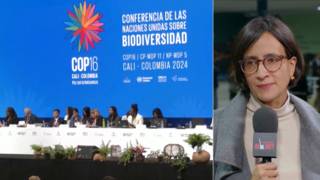
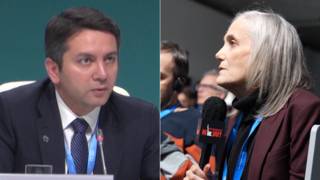

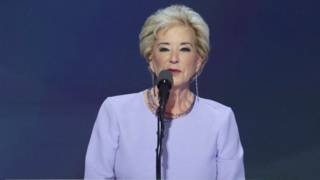





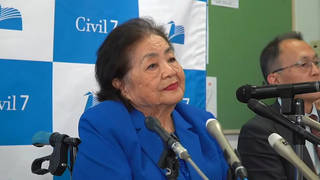
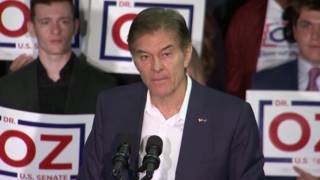
Media Options